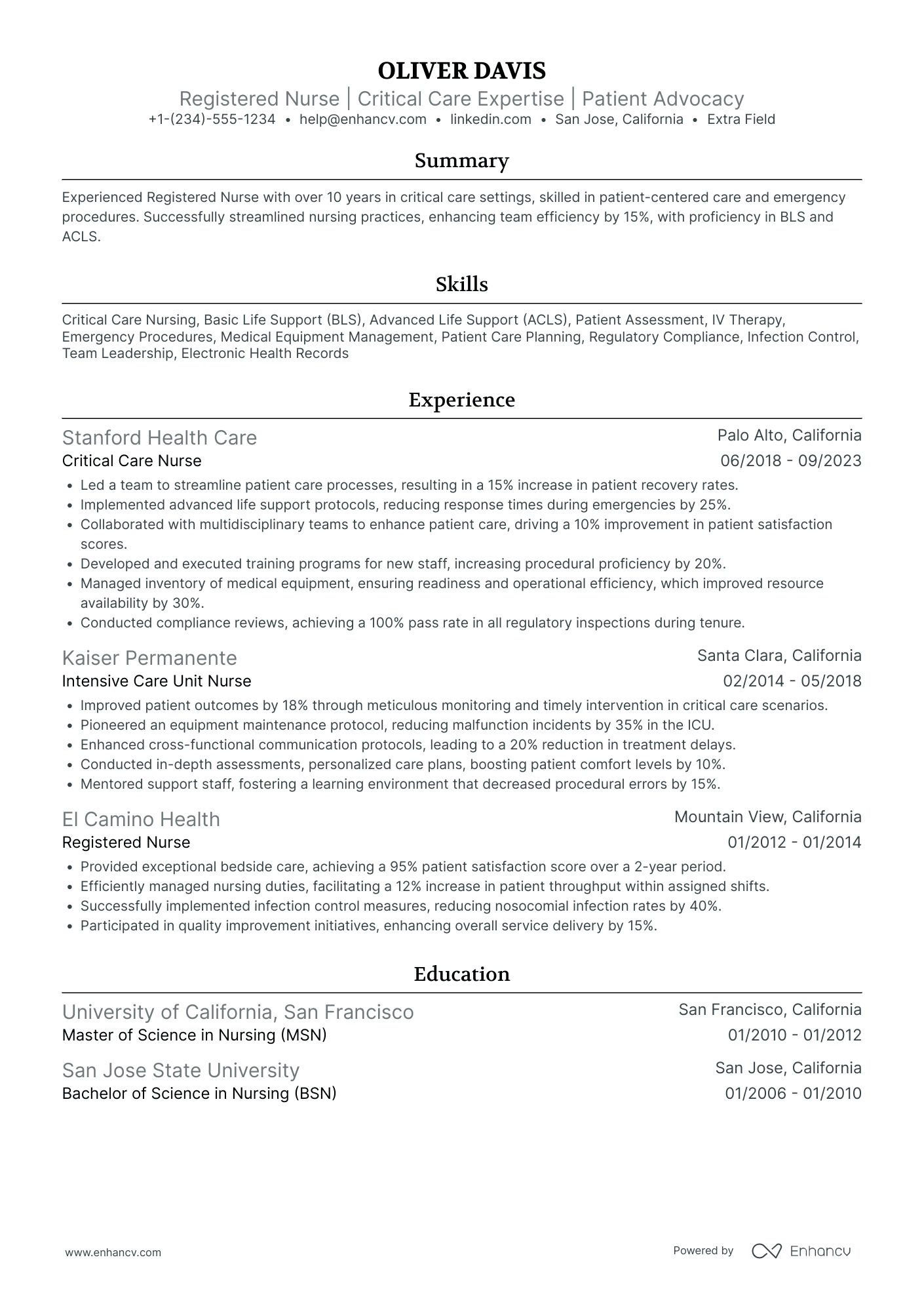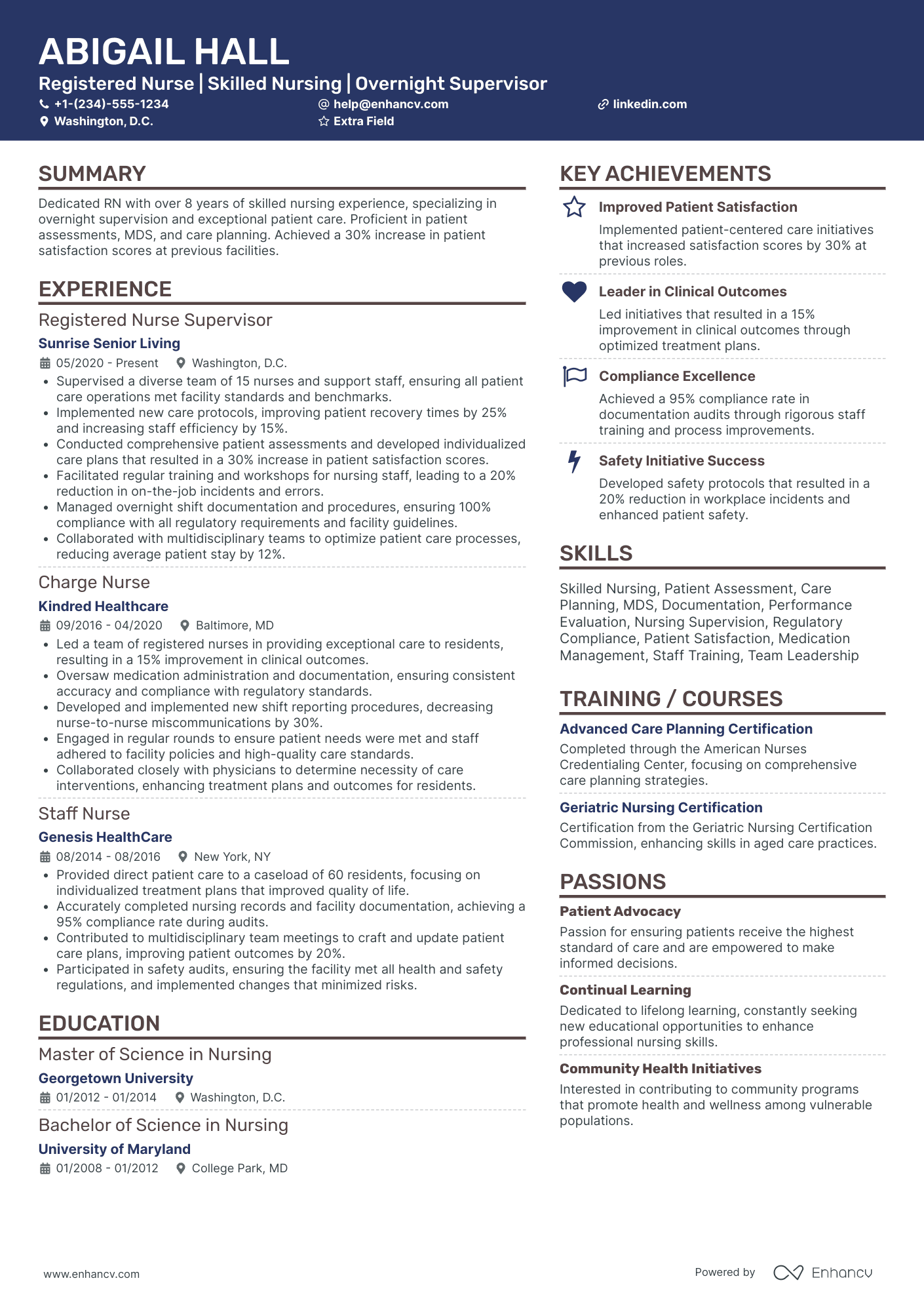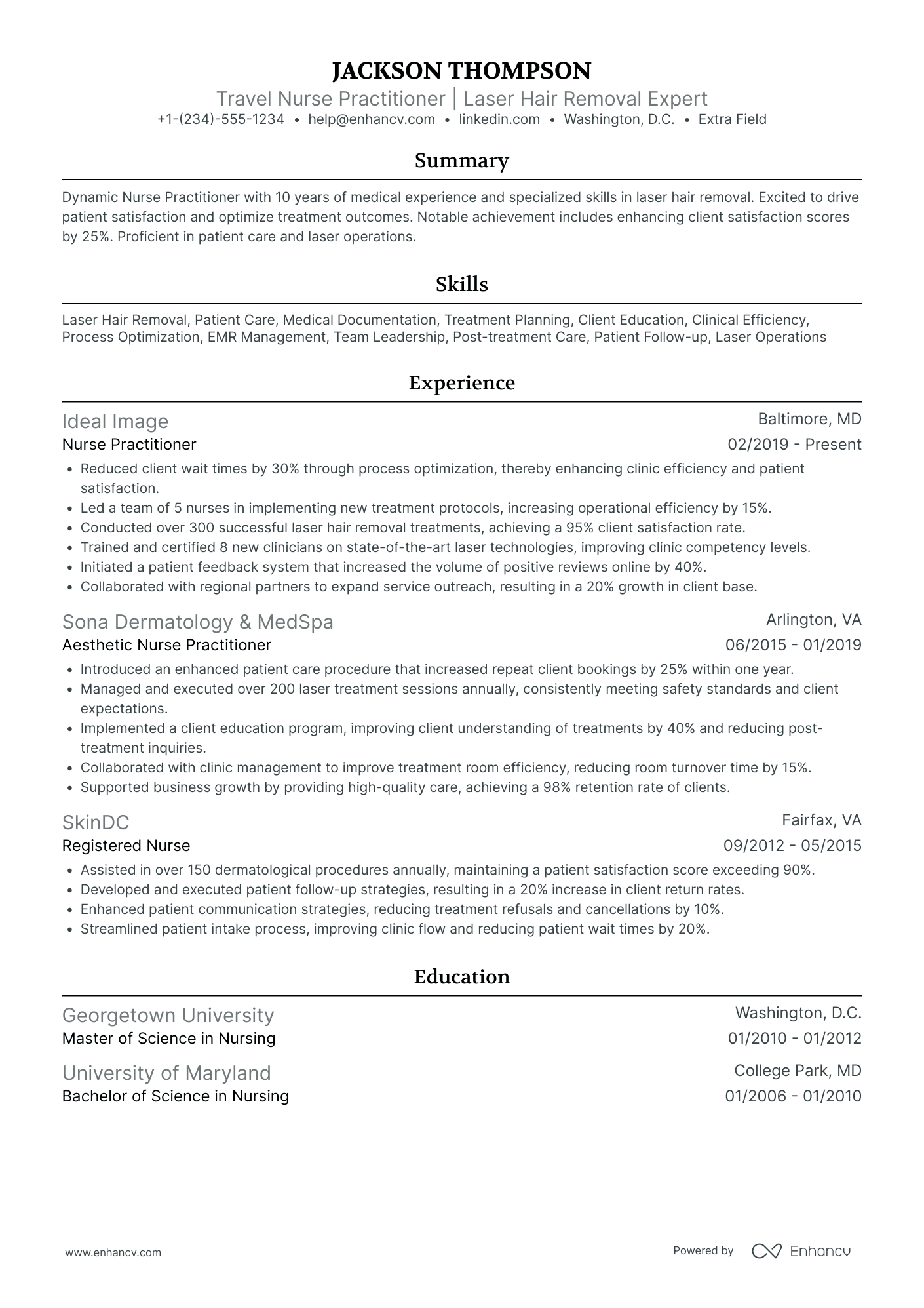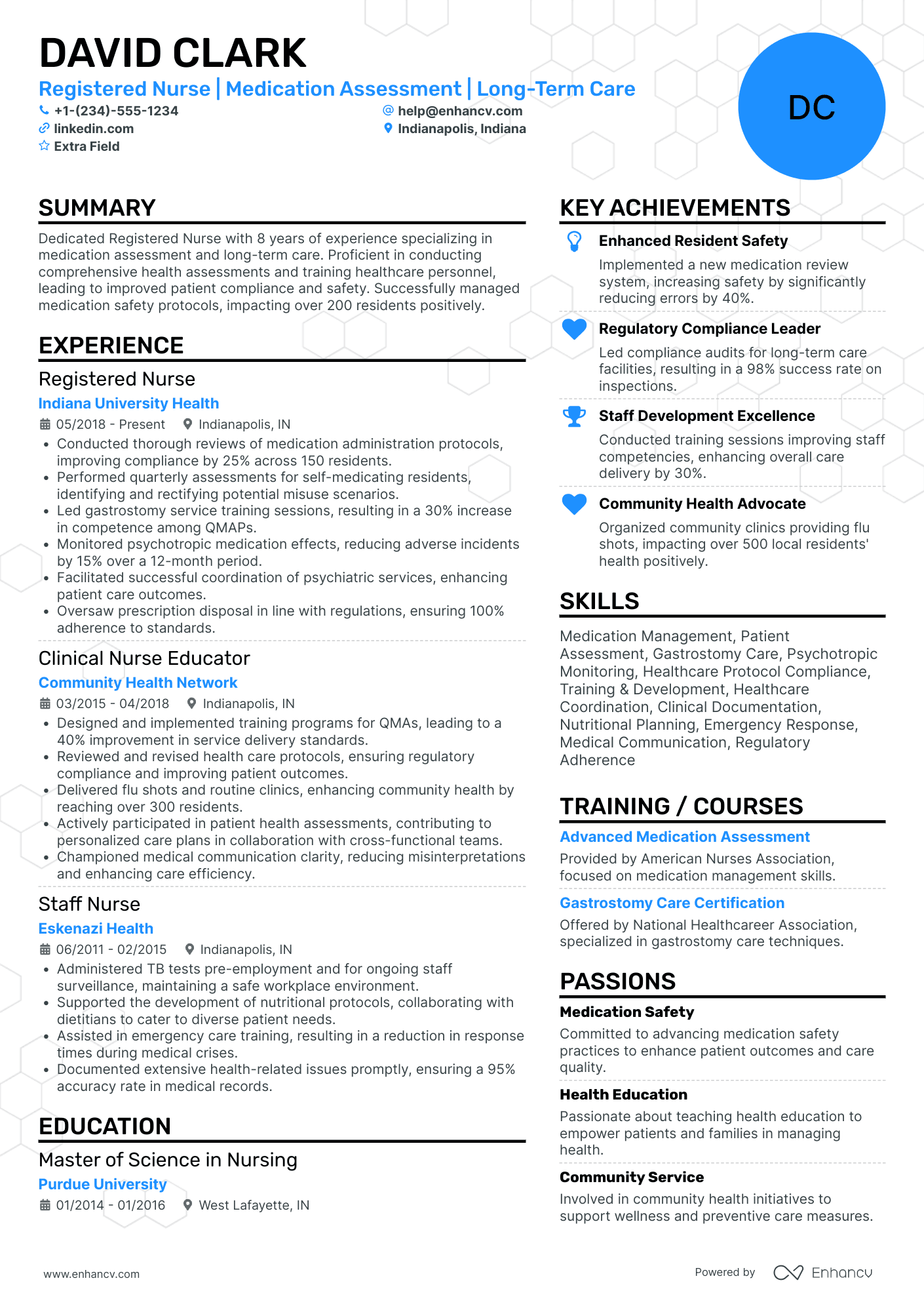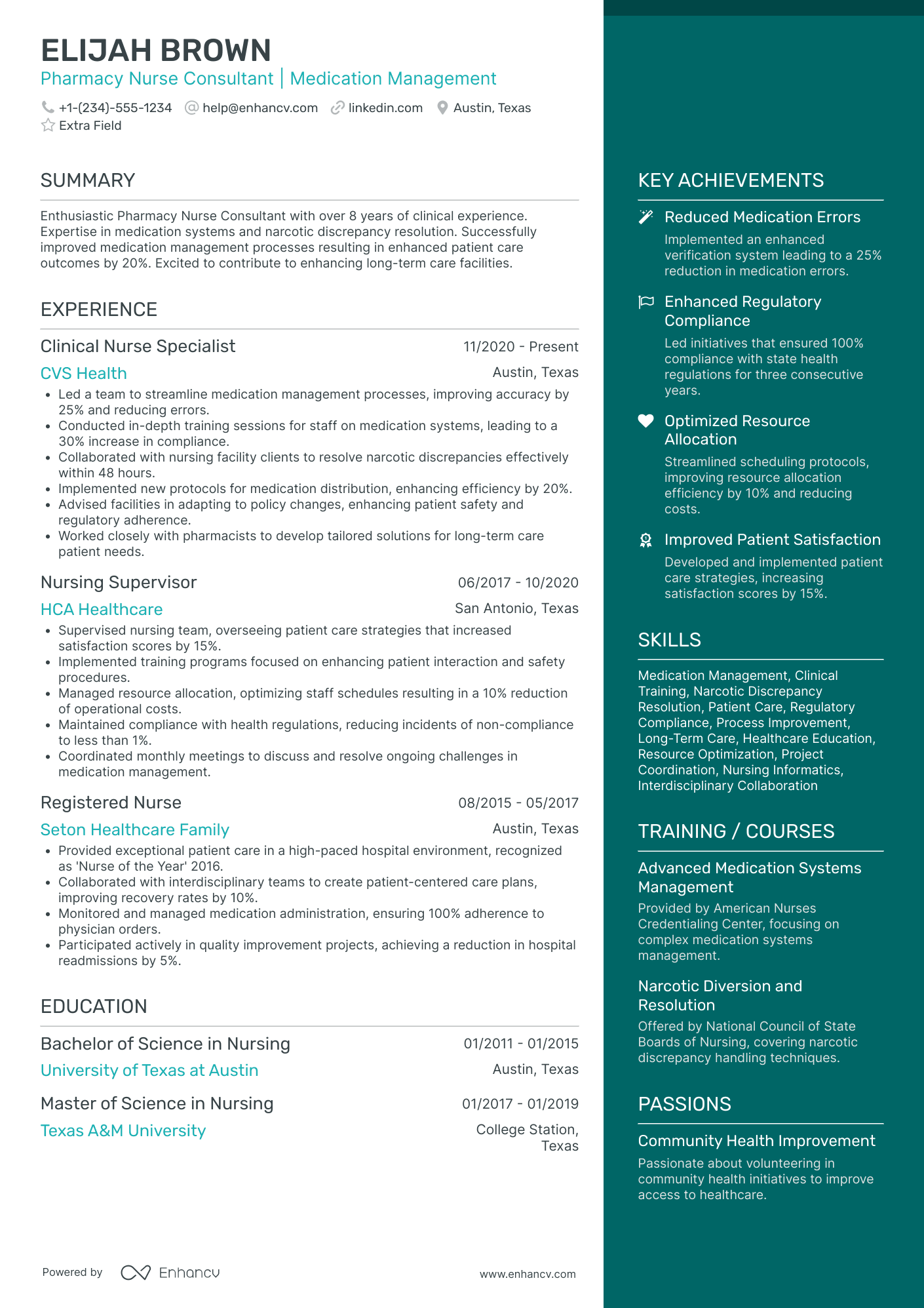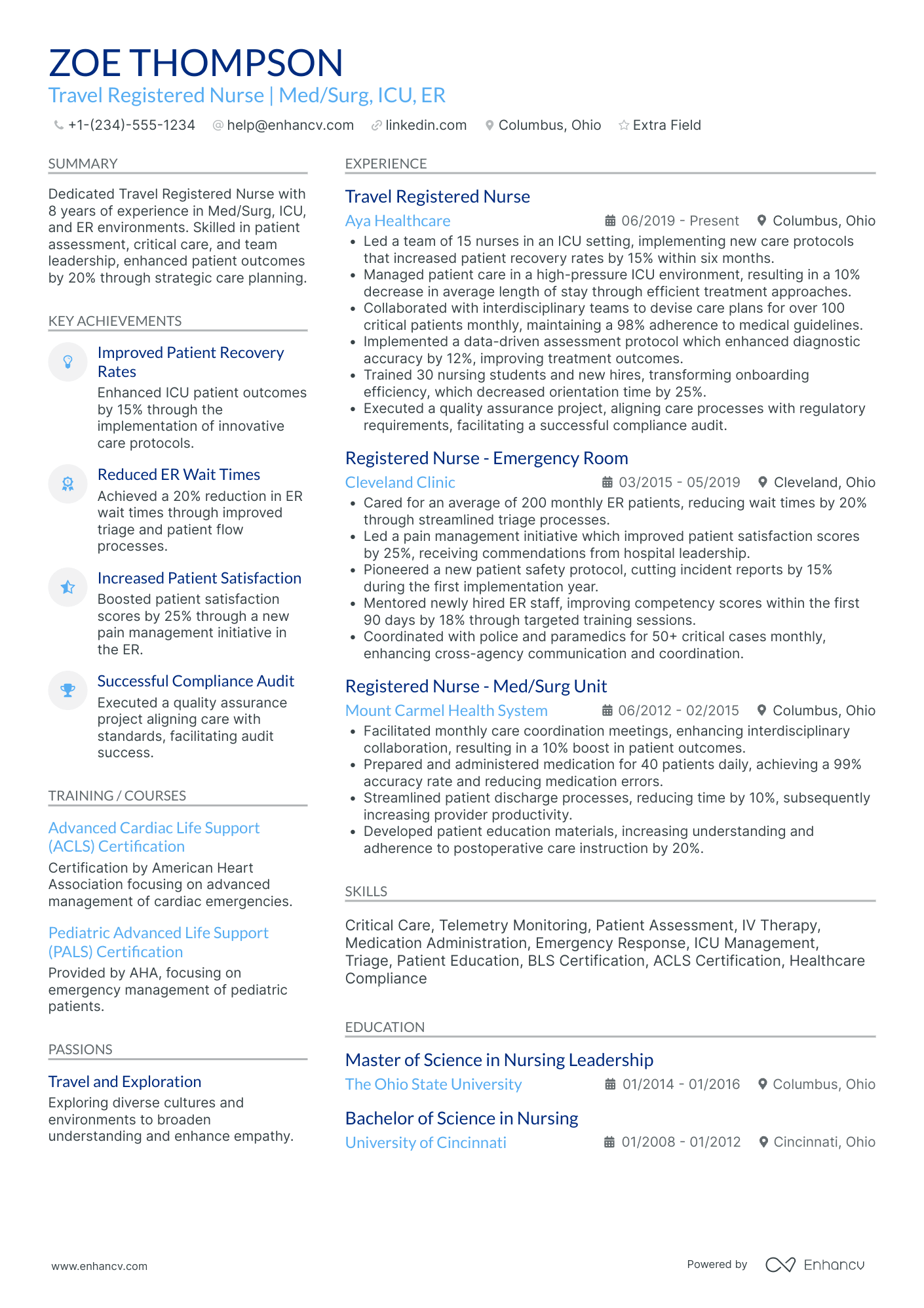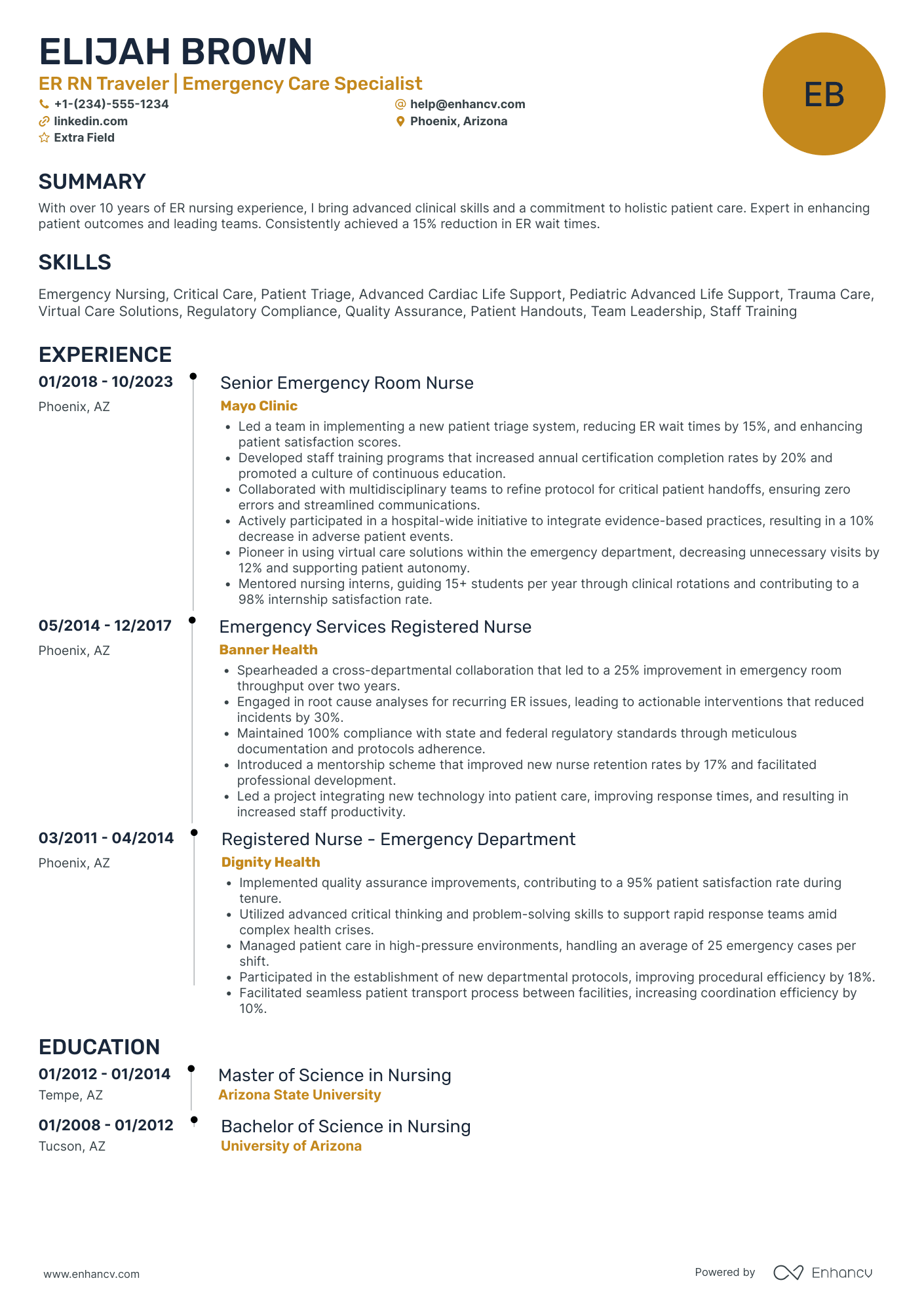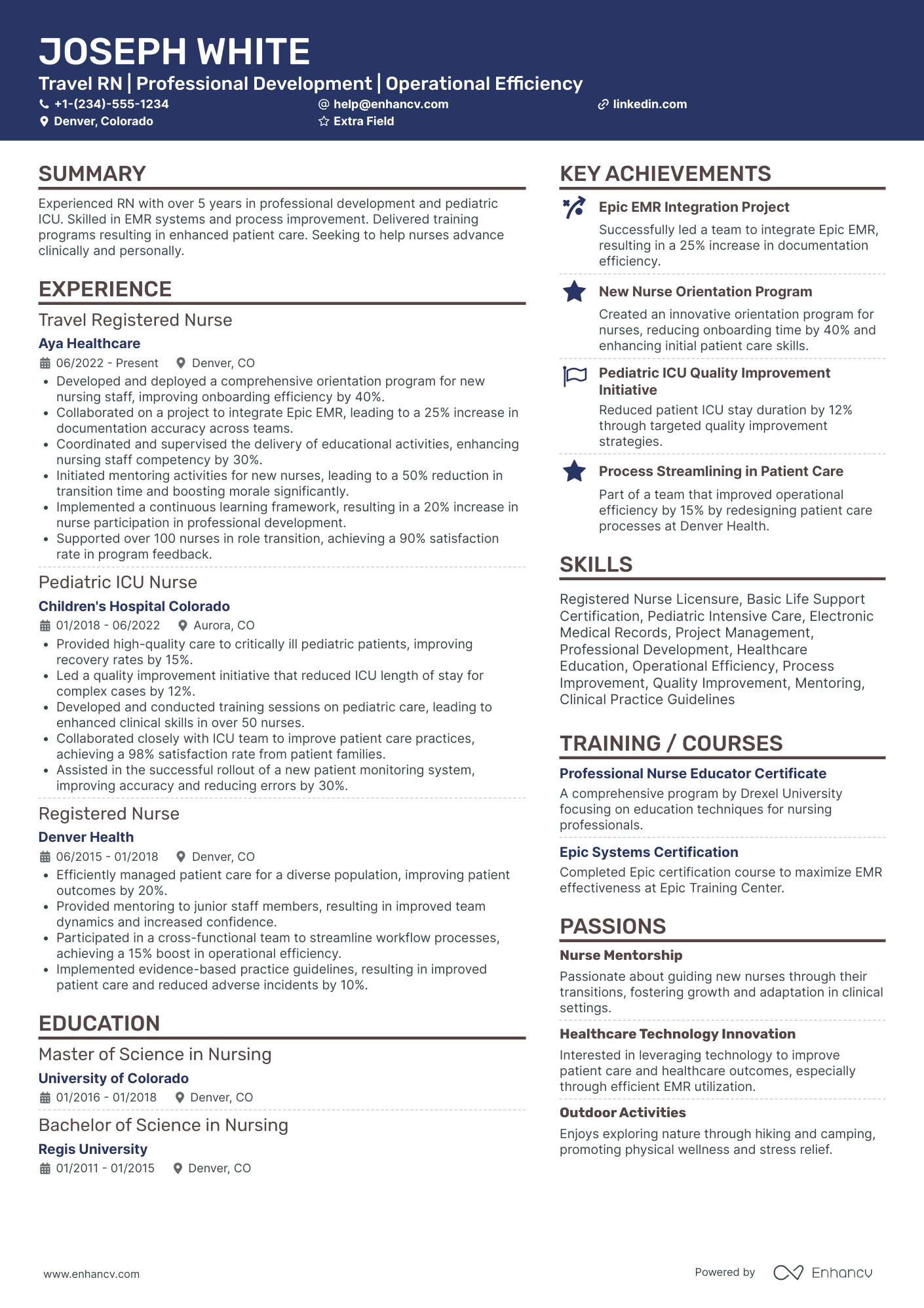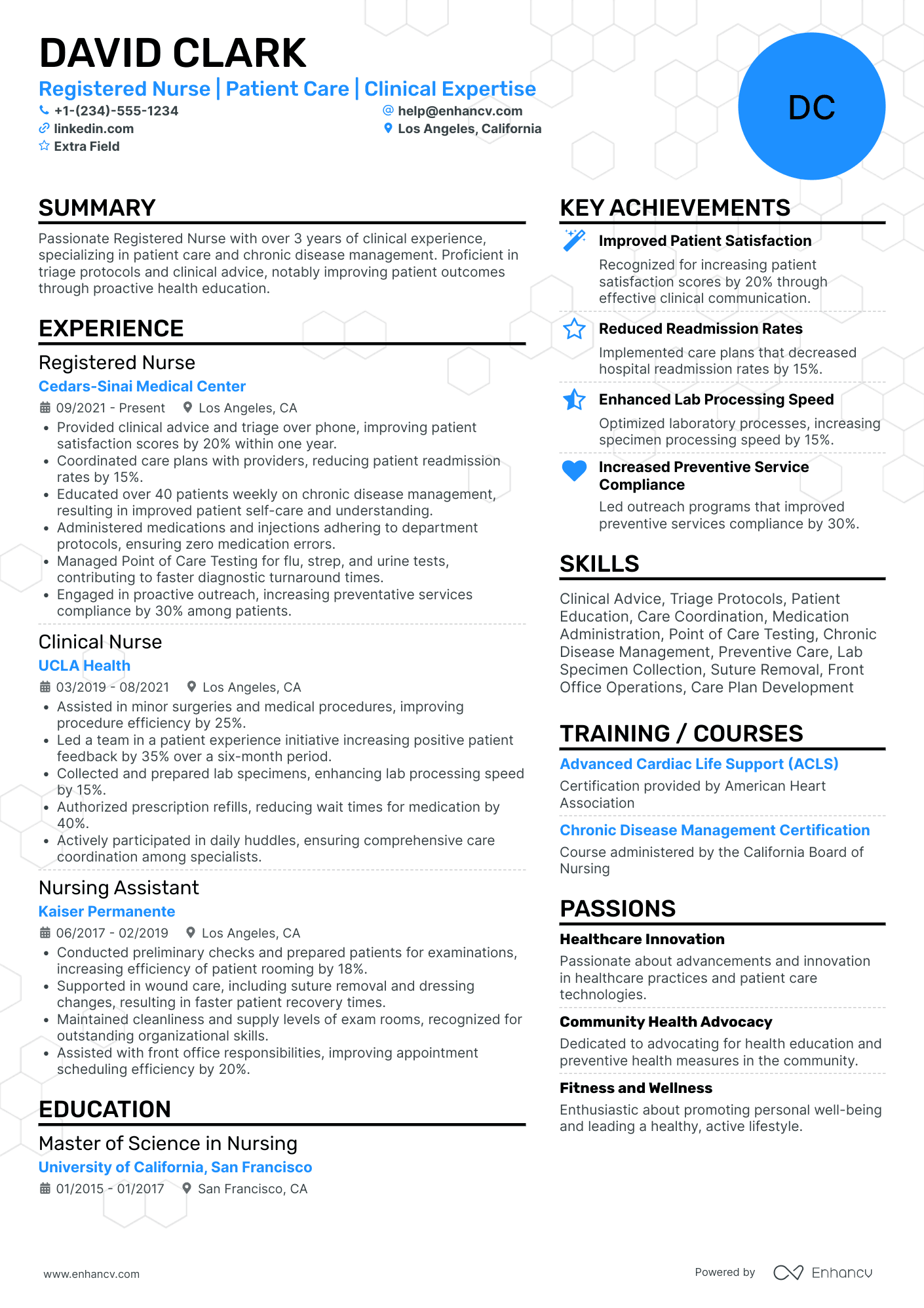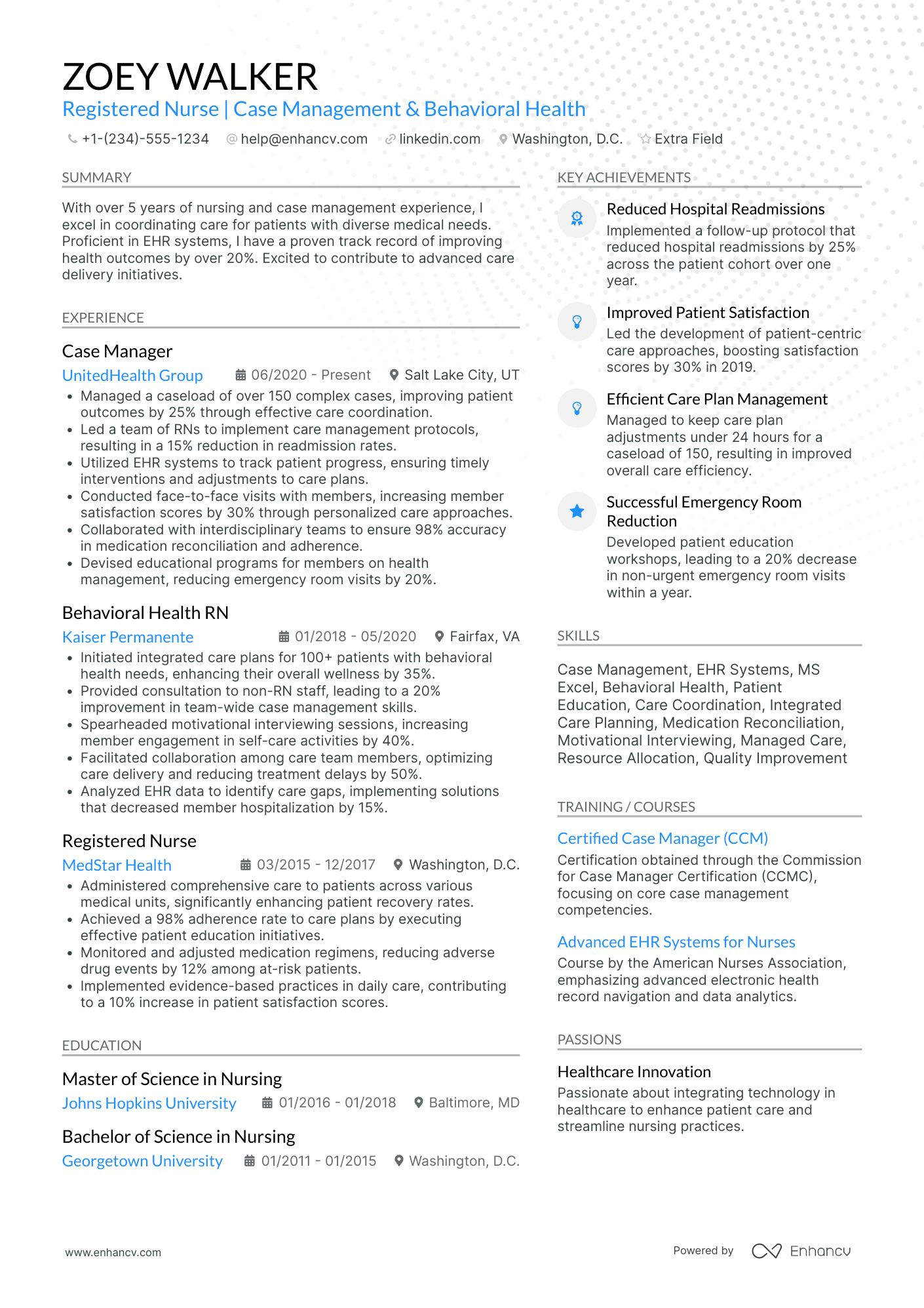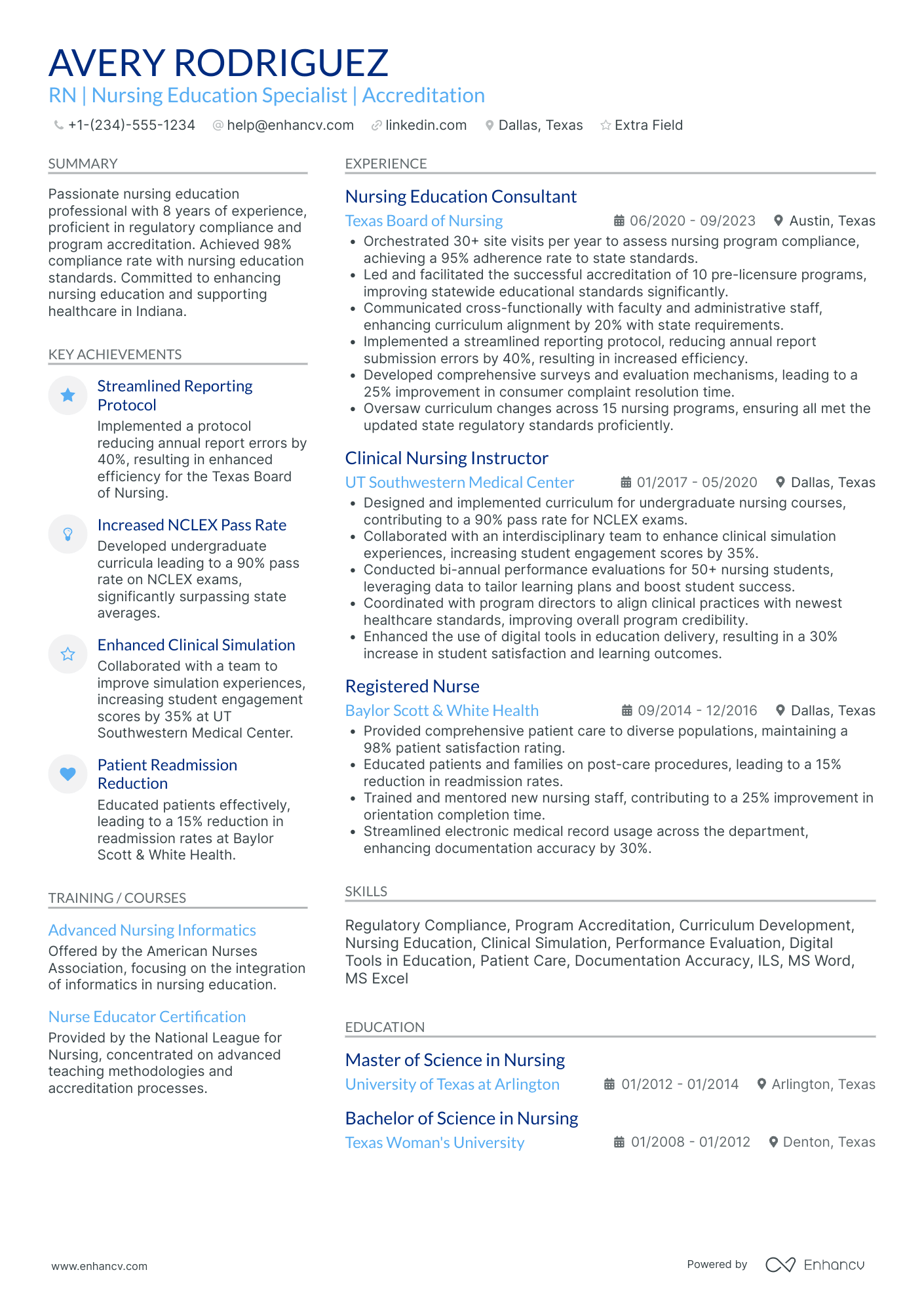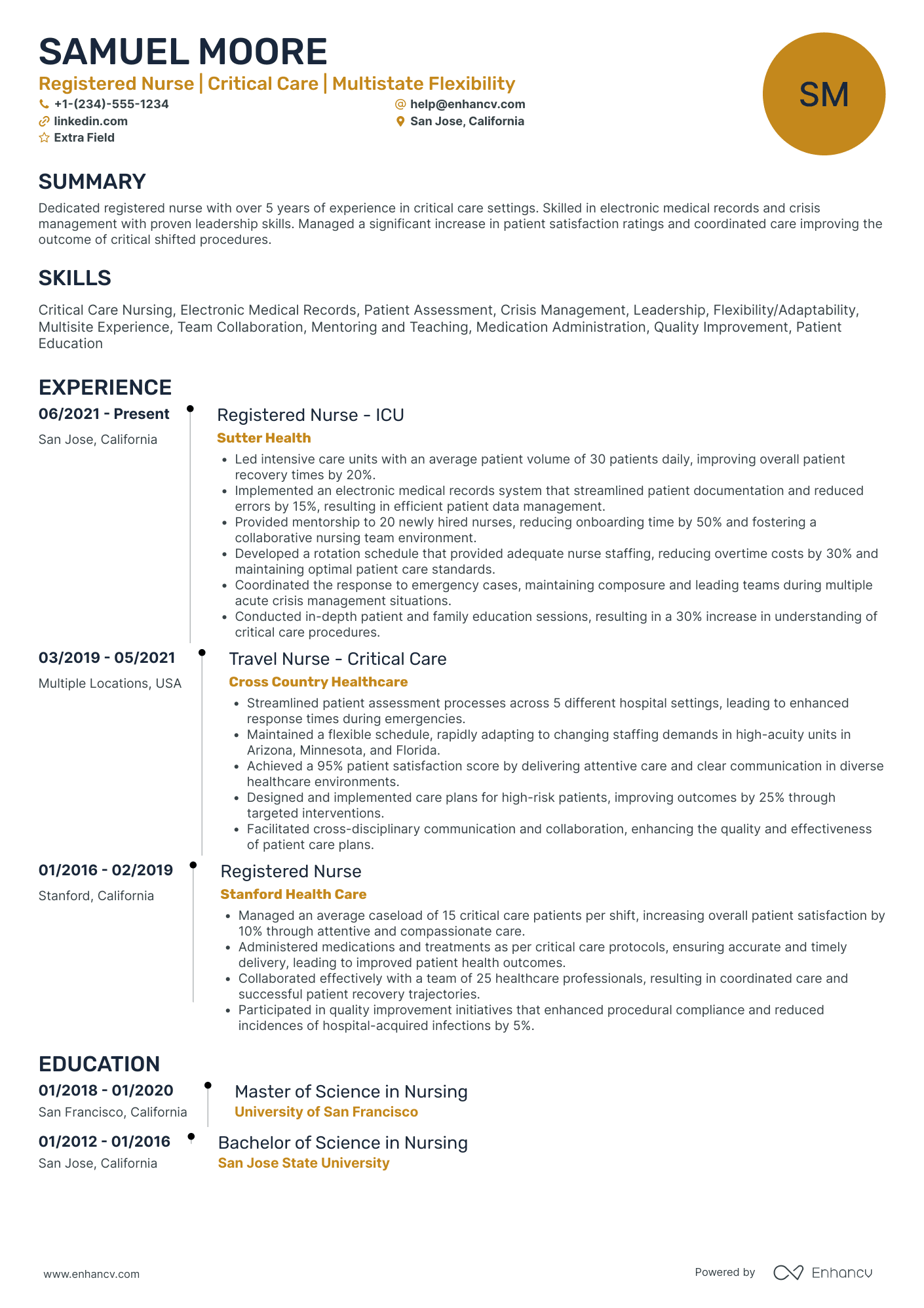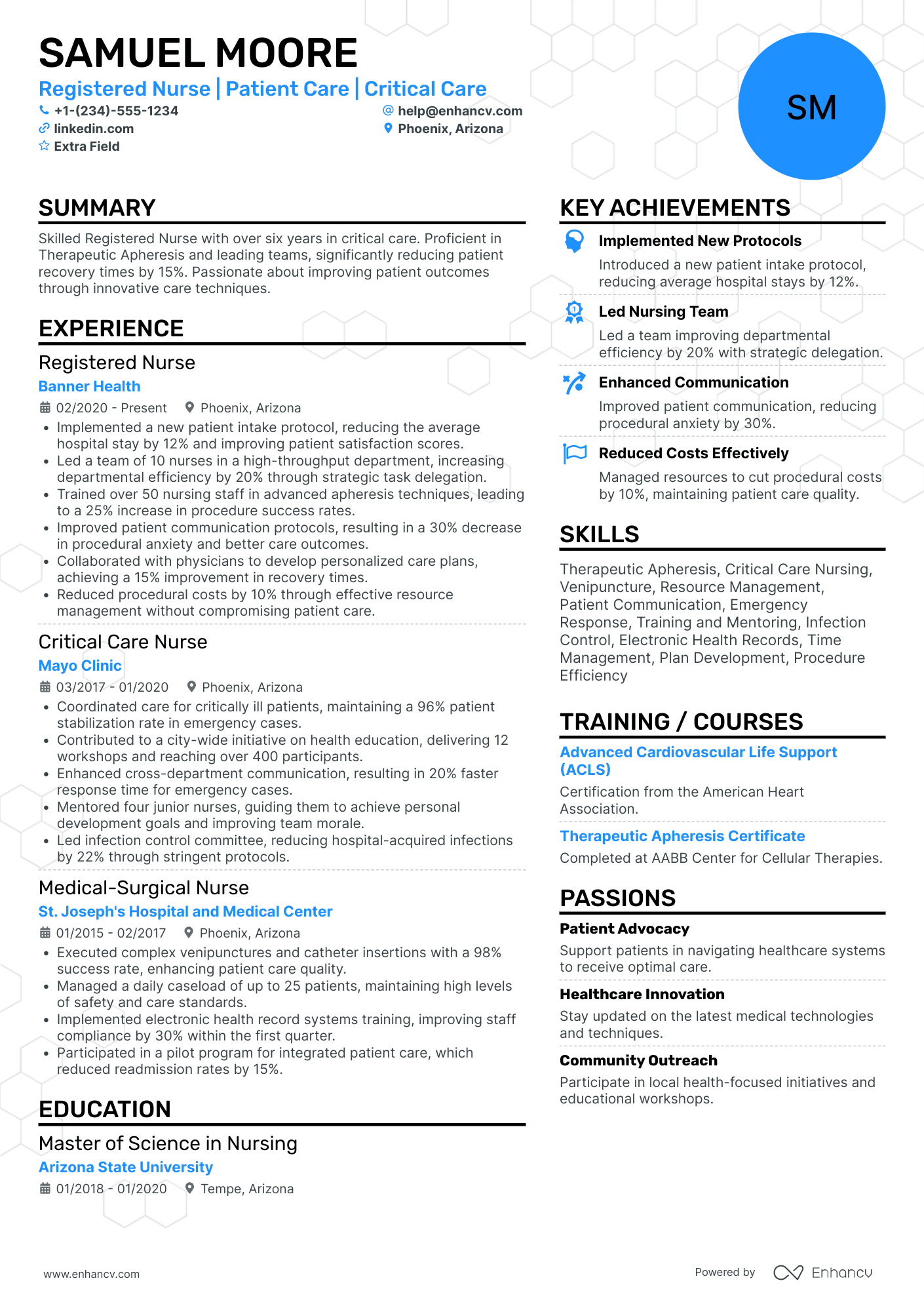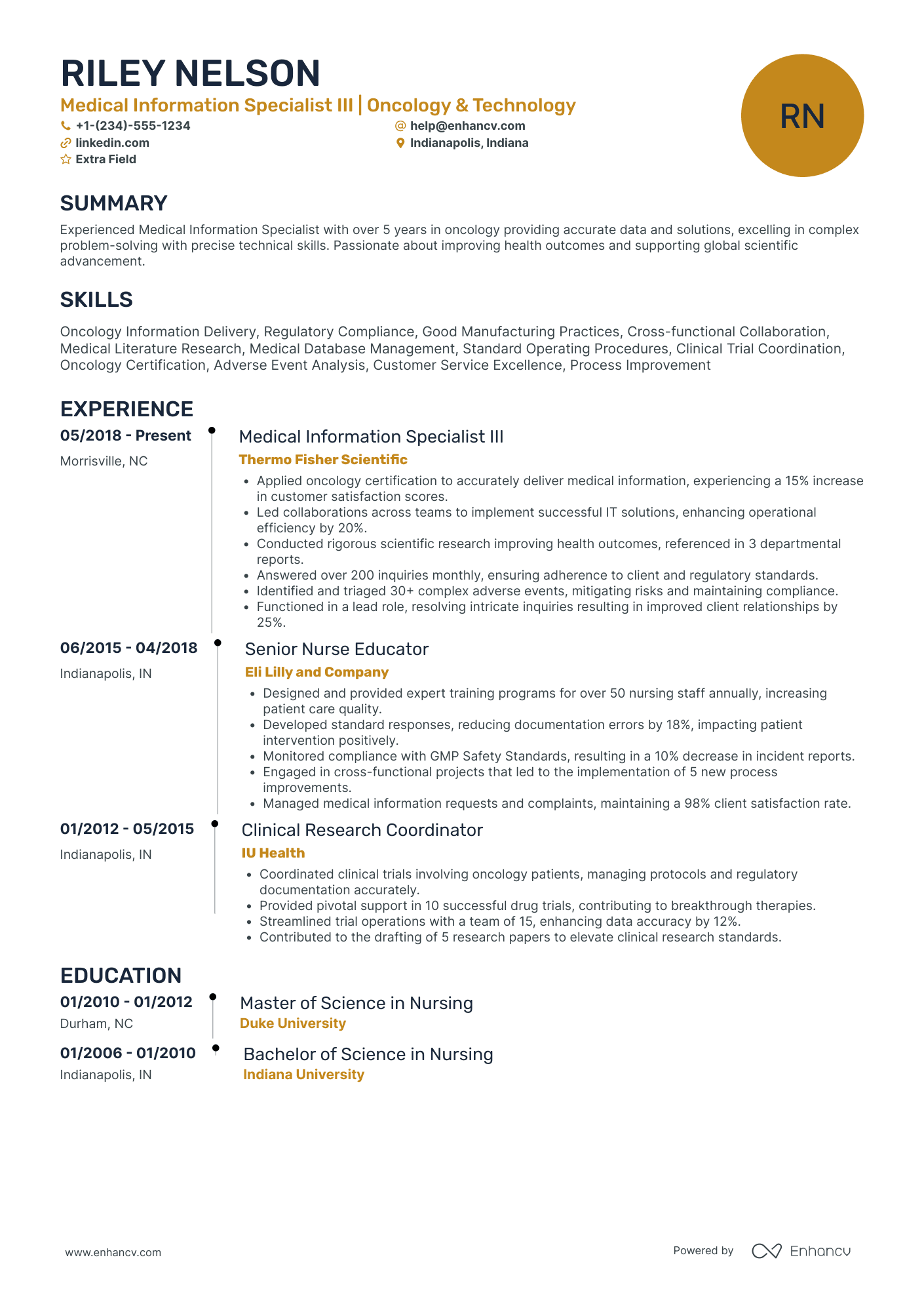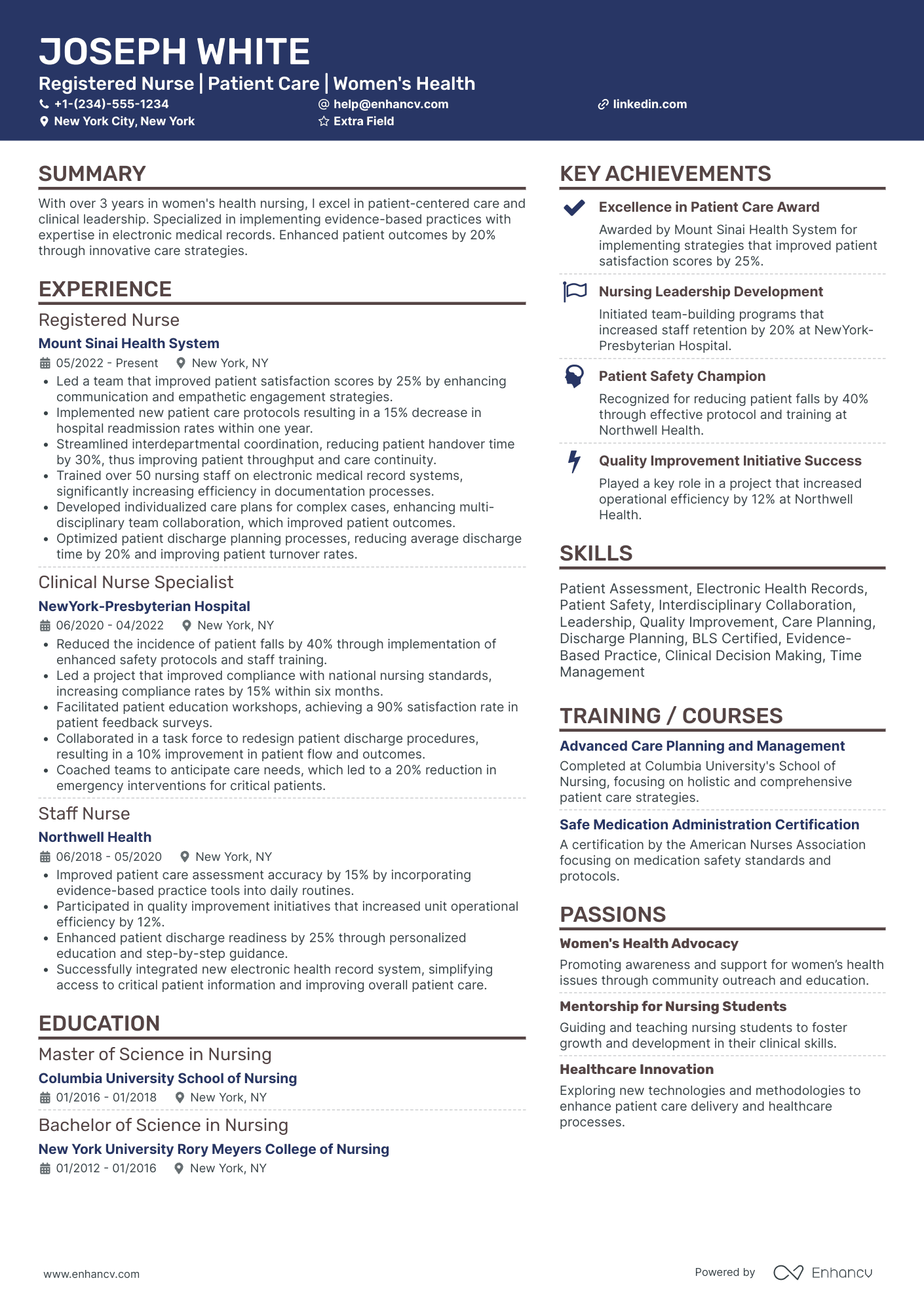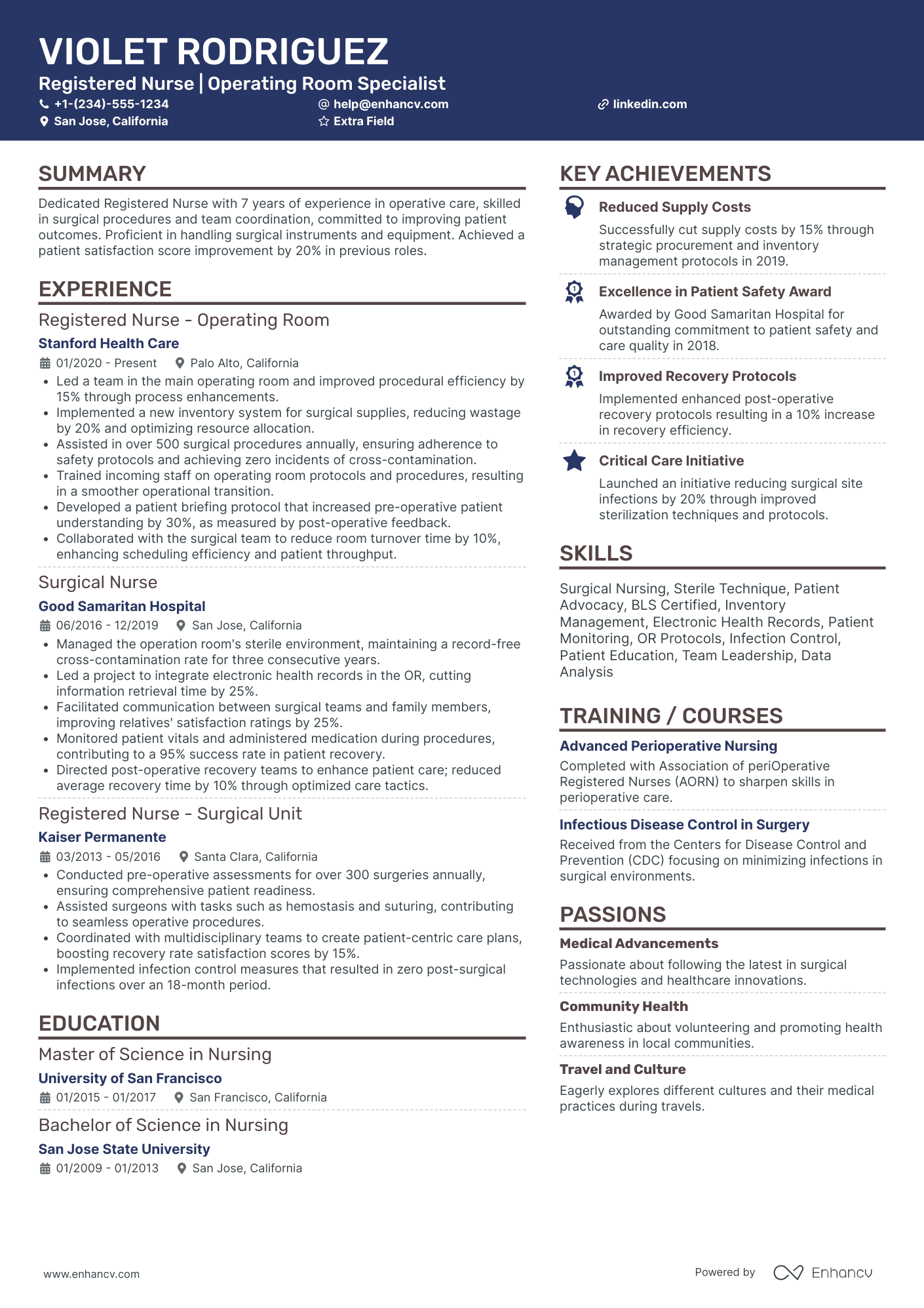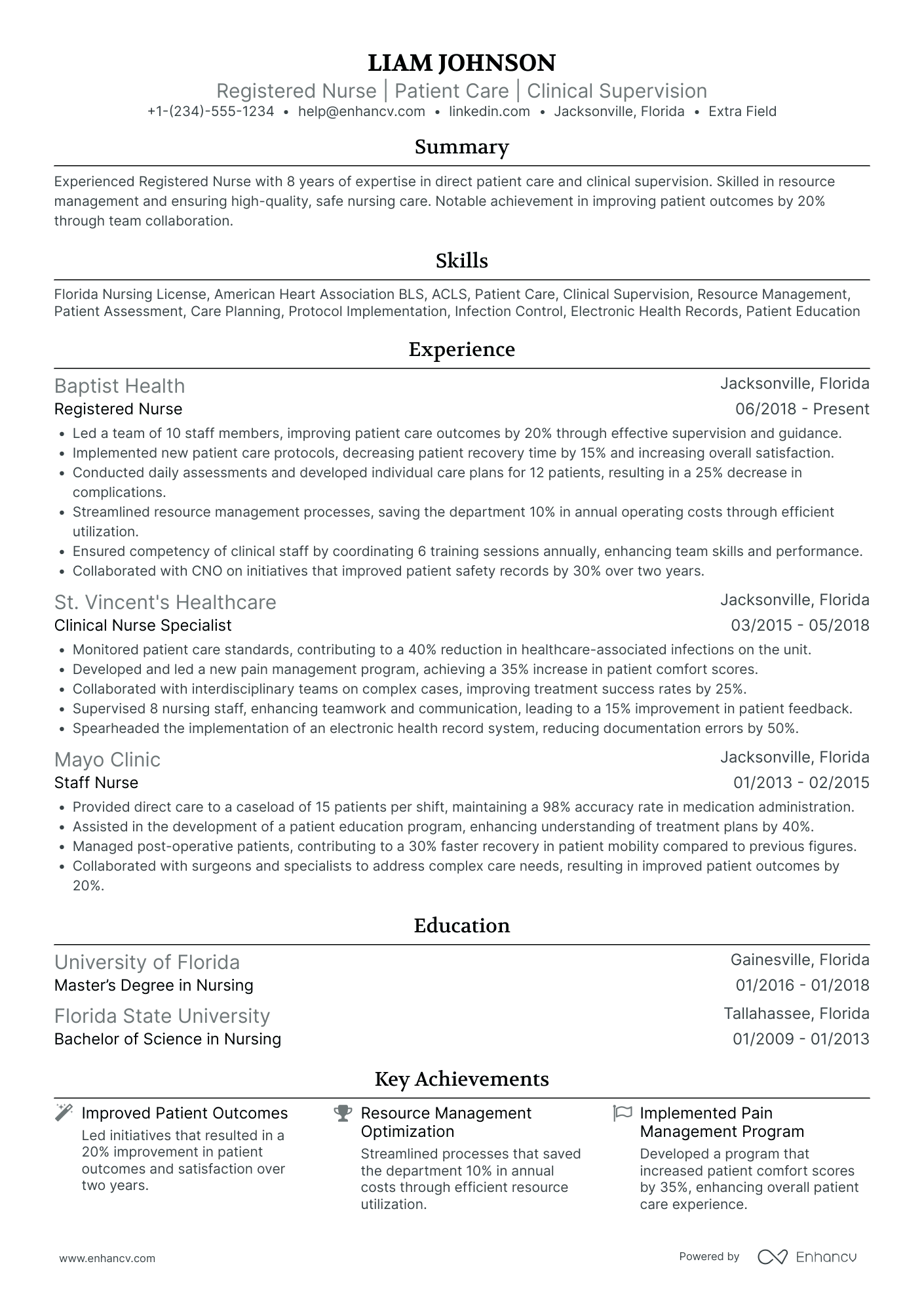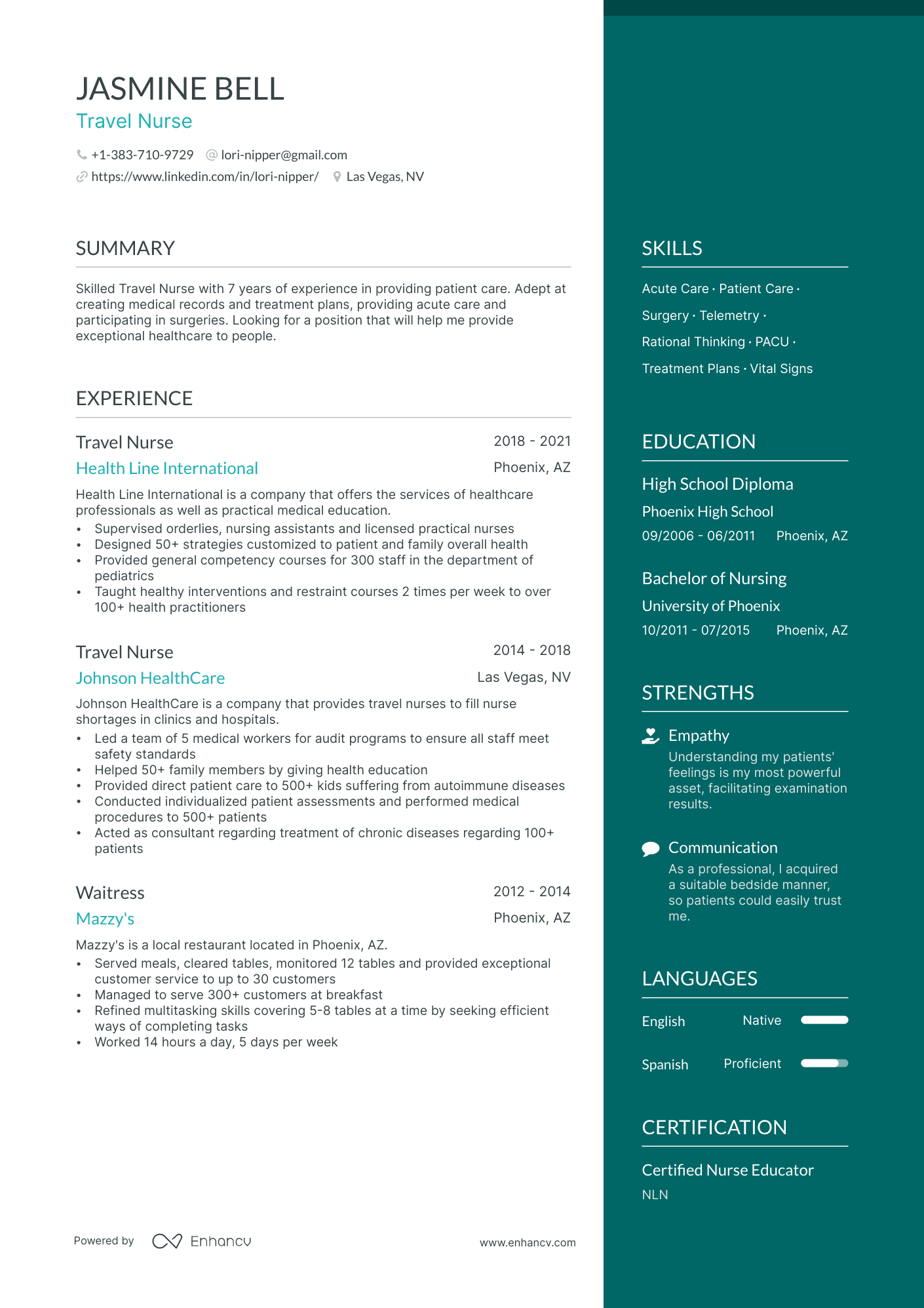Travel nurses often have a vast array of clinical experiences across different locations and specializations.
Each assignment requires its own set of skills like medical techniques, interacting with patients, and specialization training.
It can be challenging to consolidate all of those experiences into a concise and effective travel nurse resume.
We’ve created a guide to help you highlight the most relevant experiences for the job you are applying for, while also demonstrating your versatility and adaptability.
In this guide, you’ll learn:
- How to format your travel nurse resume to catch the attention of recruiters
- How to quantify past achievements to show potential employers how you will impact success at their company
- How to present the right combination of skills and tailor your travel nurse resume for your target job
- How to highlight relevant certifications so that hiring managers see that you’re qualified to fill the role
If you’re looking for something a little different from a travel nurse resume, check out some of our guides for similar roles:
- Company Nurse Resume
- Nurse Practitioner Resume
- Nurse Educator Resume
- Practice Nurse Resume
- Travel nurse Cover Letter
Travel nurse resume example
Here’s what this applicant does well in their resume:
- Experience as a travel nurse: Demonstrates a strong background in providing patient care, including designing strategies for overall health, teaching health interventions, and conducting patient assessments.
- Leadership skills: Illustrates leadership capabilities through supervising nursing staff, leading medical worker teams, and acting as a consultant on chronic disease treatments.
- Certifications and skills: Highlights relevant certifications like the Certified Nurse Educator, and specific skills essential for the role, such as acute care, surgery, and patient care management.
How to format a travel nurse resume
Format is the first thing recruiters notice when they look at a resume. Make a good impression and demonstrate your organizational skills with a travel nurse resume that’s clear and easy to read.
Travel nurses cycle through assignments that can make resumes seem fragmented if not presented well. Make the hiring manager’s job easier by summing up your experience in concise sections.
Consider these key elements for a travel nurse resume format that catches recruiters' attention:
- Reverse chronological layout - As the name suggests, a reverse chronological layout focuses on your work experience in reverse chronological order. Show that you are committed to your role and have gained clinical experience with a history of travel nurse assignments.
- Professional header - Include a header at the top of your resume that clearly states your title and professional contact information. Make a good introduction by including a certification or specialization associated with your role.
- Single page - travel nurses need to meet specific requirements that vary by location and assignment. Save recruiters time by summing up short-term assignments and including relevant information only, ensuring it all fits into one page.
- ATS optimized - Select fonts and file formats that are optimized for Applicant Tracking Systems. Use Enhancv’s resume builder to accomplish all of the above and give your travel nurse’s resume the best chance of making it to a human recruiter.
Keep in mind market-specific formats – for example, a Canadian resume might follow a different structure.
Is your resume good enough?
Drop your resume here or choose a file. PDF & DOCX only. Max 2MB file size.
The top sections on a travel nurse resume:
- Contact information: Because a recruiter needs to be able to get in touch with you.
- Professional summary:Outline your key qualifications and create a compelling snapshot of your career.
- Skills and certifications: Since travel nursing often requires specific skills and certifications, this is crucial for a recruiter.
- Work experience: A chance to show a recruiter your past experience and accomplishments in nursing, especially in different locations and settings.
- References: Important for verifying your skills and experience through your previous employers or colleagues.
Stand out to recruiters by prominently displaying the right information on your travel nurse resume.
What recruiters want to see on your resume:
- Relevant certifications: Specialized certifications show the nurse has the required skills for specific assignments and adherence to medical regulations.
- Prior travel nursing experience: This is valued as it shows adaptability to different work environments, a vital trait for travel nurses.
- Clinical skills in high-demand areas: These indicate the ability to handle challenging assignments in areas such as ICU or labor and delivery.
- Flexibility: This is key for a travel nurse as assignments could be in varying locations and schedules.
- Recommendations or references: These are important for a recruiter to verify your performance in previous assignments and assess reliability.
How to write your travel nurse resume experience
The experience section of your resume lists your work history along with 3-4 bullets highlighting your top accomplishments in the role. Show potential employers what you’ve achieved as a travel nurse while gaining clinical experience in the field with real patients.
Don’t just write a list of generic roles and responsibilities. Highlight specific instances where your skills were put to use and achieved results.
Let’s look at an example of a travel nurse’s resume experience section.
- •Cared for patients at new hospital
- •Assessed patients and referred specialists
- •Trained other nurses in inventory procedures
What doesn’t work in this example:
- No numbers: "Cared for patients at new hospital" misses an opportunity to convey the scope of work this candidate has experience with. Use real numbers and data to quantify past successes.
- No clear evidence: "Assessed patients and referred specialists" expects hiring managers to take the candidate’s word for it instead of showing specific examples. Don’t leave anything up to the imagination and include clear evidence of your claims.
- Generic tasks: "Trained other nurses in inventory procedures" doesn’t highlight any successes or the use of industry skills. Include measurable outcomes and specific tools and techniques to show proficiency in the role.
Let’s make a few changes and take another look.
- •Cared for 500+ patients at the launch of a new pediatric hospital.
- •Assessed individual patient needs and referred families to specialists in newborn care.
- •Trained 35 nurses in MedSupply inventory software that reduced errors by 15%.
What works in this example:
- Quantifies impact: "Cared for 500+ patients at the launch of a new pediatric hospital" gives hiring managers a clear idea of this candidate’s experience with patients and specialized knowledge of pediatric care.
- Evidence of success: "Trained 35 nurses in MedSupply inventory software that reduced errors by 15%" shows how this candidate has achieved success using tools that are relevant to the target role.
- Industry skills: "Assessed individual patient needs and referred families to specialists in newborn care" shows how this candidate has used their training on the job and what they will bring to their target company.
How to quantify impact on your resume
Unlike permanent staff who can speak to long-term projects or quality improvement initiatives, travel nurses may struggle to convey their impact in concrete terms.
Focus on achievements that highlight immediate impact and rapid adaptation skills. Show potential employers how you will impact success by providing measurable results.
Here are a few areas to consider while quantifying impact on your travel nurse resume:
- Include the number of states or countries where you've worked: This shows geographical flexibility and readiness to adapt to different cultures and institutions.
- Document the number of assignments you have completed: This provides an overview of your experience in different medical teams and settings.
- Specify the number of patients you managed daily or per shift: This demonstrates your ability to handle workload and stress.
- State how many procedures or treatments you've performed: This reflects your hands-on experience and competence.
- Specify the number of years or months in specialty areas: This highlights your expertise in particular fields.
- Mention any significant reduction in readmission rates under your care: This demonstrates your effectiveness and impact as a nurse.
- Highlight your quickest response time in emergency cases: This shows how efficient and quick-thinking you are in high-pressure situations.
- Specify your perfect attendance record, if any: A record of consistent attendance shows reliability and dedication to your role.
How do I write a travel nurse resume with no experience
If you’re making a career change or applying for your first job as a travel nurse, then you need to highlight experiences outside of work history.
The best approach is to write a functional resume that focuses on transferable skills rather than experience to show potential employers how you’ve prepared for the role.
Follow these steps to write an effective entry-level travel nurse’s resume:
- Choose a functional resume layout
- Focus on transferable skills
- Present credentials and licenses clearly
- Tailor every section to fit your target job
Don’t pad your experience section with irrelevant jobs just to fill space. Only include roles that are relevant to your target position and focus on transferable skills.
Being a travel nurse requires a dynamic set of skills so there is a wide range of jobs that show transferable skills.
Previous roles in healthcare can highlight medical training and clinical experience. Service jobs can demonstrate your ability to interact with people. Even consulting or management roles can highlight your experience traveling for short-term assignments.
How to list your hard and soft skills on your resume
travel nurses are skilled medical professionals. You also have the interpersonal skills to provide compassionate care to patients and the flexibility to relocate for weeks at a time.
Your travel nurse’s resume will present your skills in two major categories.
Hard skills are the technical knowledge and abilities needed to perform job duties, whereas soft skills are the interpersonal and communication skills needed to interact with others.
Hard skills tend to be straightforward and can appear in a simple list form. Here is an example of hard skills on a travel nurse’s resume.
Only include hard skills that you’re proficient in and are relevant to your target job. Show potential employers that you have the right combination of skills to fill the role.
Here are a few more hard skills to consider for your travel nurse’s resume.
Best hard skills for your travel nurse resume
- Intensive Care Unit (ICU) skills
- Neonatal Intensive Care Unit (NICU) skills
- Emergency Room (ER) skills
- Operating Room (OR) skills
- Electrocardiogram (EKG) operation
- Ventilator care
- Advanced Cardiovascular Life Support (ACLS)
- Pediatric Advanced Life Support (PALS)
- Pediatric Intensive Care Unit (PICU) skills
- Telemetry skills
- Medical software proficiency (EPIC, Cerner)
- Cpr Certified
- Surgical assisting skills
- Phlebotomy skills
- IV therapy skills
- Wound care skills
- Cardiac Care skills
- Knowledge of healthcare laws and regulations
- Bilingual or multilingual
- Familiarity with Electronic Health Record (EHR) systems
Soft skills can be open to interpretation and are most effective when provided with an example. Be specific in your soft skills and avoid overused buzzwords on your resume.
Here is an example of a soft skills section on a travel nurse’s resume.
Here are a few more soft skills to consider for your travel nurse’s resume.
Best soft skills for your travel nurse resume
- Adaptability
- Compassion
- Empathy
- Problem-solving skills
- Communication skills
- Time Management
- Stress tolerance
- Multitasking ability
- Interpersonal skills
- Attention to detail
- Cultural sensitivity
- Self-motivation
- Leadership skills
- Patience
- Initiative taking
- Teamwork
- Resilience
- Decisiveness
- Critical thinking
How to list your certifications and education on your resume
Minimum education requirements for travel nurses typically include an associate's degree in nursing (ADN) or a bachelor of science in nursing (BSN) is required. Travel nurses must also be registered nurses (RN).
Additional licensure and clinical experience requirements may vary by location and organization. Be sure to research the necessary qualifications for your target job.
Your education section should include:
- Name of institution
- Name of degree
- Years attended
Let’s look at an example of a travel nurse’s resume education section.
Your travel nurse certification section will include any certifications in nursing and specializations.
Here is an example of a certification section on a travel nurse’s resume.
Show a commitment to your career by continuing to gain certifications in the industry as trends and demand evolve. Increase your employability by keeping your travel nurse resume up to date.
Here are a few more certifications to consider for your travel nurse’s resume.
Best certifications for your travel nurse resume
How to write your travel nurse resume summary or objective
A summary or objective is an opportunity to introduce yourself and your value in the industry as a travel nurse. It captures your career history and top accomplishments in 3-4 sentences.
Though the terms are often used interchangeably, there is a slight difference between a summary and an objective.
A summary is a brief introduction that summarizes your career and top achievements. An objective looks to the future and captures what you are hoping to achieve in your new position.
A summary is more suitable for candidates with experience in the field. Entry-level candidates are more likely to focus on an objective.
If you have at least some experience in the field as a travel nurse, combine them by writing an introduction, a career highlight, and a goal you share with your target employer.
First, let’s take a look at a travel nurse’s resume summary example that is less effective.
What doesn’t work in this example:
- Unclear experience: “Experienced travel nurse with a passion for patient care” doesn’t provide any specifics to show hiring managers what this candidate has accomplished. Use numbers and examples in your summary to get your message across clearly.
- General claims: “Skilled in cardiac care technologies” doesn’t speak to specific skills or industry knowledge. Take the opportunity to share a top career highlight and show how you have used your skills to achieve success.
- Blanket statements: “Seeking opportunity as a travel nurse with a new agency” gives the impression that this resume is being mass-emailed to job openings. Tailor your resume to your target job so hiring managers know you did your research on their company.
Let’s make a few changes and take another look.
What works in this example:
- Highlights specialty: "Cardiac Care Certified travel nurse with 8 years of experience in the field” speaks to this candidate’s specific experience and training. Show potential employers why you’re the right fit with a strong opening line.
- Quantifies impact: “Expert in Advanced Cardiovascular Life Support (ACLS) with a 98% patient satisfaction rating” shows how this candidate has used their skills to achieve success. Potential employers want to see how you will impact success at their organization.
- Targeted goal: “Seeking opportunity as Lead travel nurse with Cardiac Care International” shows that this candidate has researched the company and is bringing solutions to their specific role.
Optimize your resume summary and objective for ATS
Drop your resume here or choose a file.
PDF & DOCX only. Max 2MB file size.
Additional sections for a travel nurse resume
If you’ve developed relevant skills outside of the traditional career path, you may want to find other ways to incorporate them into your travel nurse resume.
Additional sections on your resume can be a great way to show how you’ve prepared to work as a travel nurse in unique ways.
Here are a few sections to consider adding to your travel nurse’s resume:
- Languages - Speaking more than one language can be a great skill for a travel nurse, especially for assignments that cover areas where multiple languages are spoken.
- Continuing Education - With the medical field constantly advancing and evolving, travel nurses need to stay current on the latest trends and technologies. Increase your employability by updating your resume with new industry knowledge.
- Volunteer Work - Volunteering is a great way to develop soft skills necessary for travel nurse assignments like adaptability, communication, and decision-making under pressure.
Key takeaways for writing a great travel nurse resume
Congratulations! You’re just about ready to send that amazing travel nurse resume out into the world. Before you go, let’s review a few key points from this guide.
- Format your travel nurse resume in concise sections that sum up assignments so recruiters can get a clear idea of your experience quickly and clearly.
- Include only relevant skills and information, so hiring managers know that you have the right combination of industry knowledge to fill their specific role.
- Quantify your achievements by using real numbers and measurable data so that potential employers can see how you will impact success at their agency.
- Keep your travel nurse resume up to date by staying current with industry trends and continuously earning certifications in your field.
Travel Nurse resume examples
By Experience
By Role
